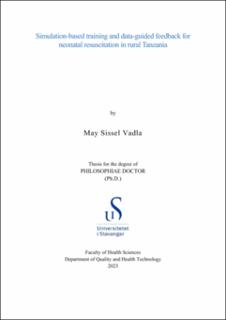Simulation-based training and data-guided feedback for neonatal resuscitation in rural Tanzania
Doctoral thesis
Permanent lenke
https://hdl.handle.net/11250/3089195Utgivelsesdato
2023Metadata
Vis full innførselSamlinger
- PhD theses (HV) [52]
Originalversjon
Simulation-based training and data-guided feedback for neonatal resuscitation in rural Tanzania by May Sissel Vadla, Stavanger : University of Stavanger, 2023 (PhD thesis UiS, no. 711)Sammendrag
Summary
Background: Globally, 1.4 million newborns die every year due to intrapartum related events and fresh stillbirths, nearly all occurring in low and middle-income countries. Many of these deaths could be prevented if the non-breathing newborns received skilled and timely bag-mask
ventilation at birth. Neonatal resuscitation guidelines recommend onset of bag-mask ventilation for non-breathing newborns within the first minute of life, the so-called Golden Minute. Guideline adherence for timely ventilation is challenging in clinical practice, and a multi-country study demonstrated that less than one percent of newborns were ventilated within the Golden Minute. The Helping Babies Breathe educational program improves knowledge and simulated skills in neonatal resuscitation. However, two systematic reviews found no overall difference in stimulation, suctioning, or bag-mask ventilation after implementation of the program, demonstrating the challenge of translating improved training-skills into clinical practice. The Helping Babies Breathe 2nd Edition addresses the challenges regarding program implementation and achievement of sustainable results.
Aim: The overall aim of the thesis was to investigate the effects of several quality improvement/simulation-based training interventions, on simulation-based training performance, clinical practice, and perinatal outcome.
Methods: The study design was a prospective, pre/post observational study conducted over a six-year period from 01.09.2015 to 31.08.2021, including two years post-intervention at a rural referral hospital, Haydom Lutheran Hospital, in Tanzania. We conducted three studies throughout the study period. In Study I, initiated September 2016, a novel newborn simulator was implemented for in-situ, individual skill-training, and scenario team-training at labour ward, consistent with the Helping
Babies Breathe 2nd Edition program. In Study II, initiated October 2017, local champions were appointed to encourage the midwives for enhanced simulation-based training effort. And finally, in Study III initiated September 2018, the local champions facilitated scenario team-trainings and led a quality improvement project, the Golden Minute Campaign. The campaign included data-guided scenario team training, frequent quality improvement meetings and clinical debriefings, and engaged all healthcare workers at labour ward and participants from the management. The study included a two-year post-intervention period. Data regarding training frequency and performance was collected automatically from the newborn manikin (Study I). All births, resuscitations and newborns were observed by trained research assistants and documented using a comprehensive data collection form containing wide-ranging information (Study II and III). In addition, physiological measures from the resuscitations were collected by a newborn resuscitation monitor for Study II.
Results:
Study I demonstrated increased training frequency, training performance and staff participation after the appointment of local champions to motivate for simulation-training in neonatal resuscitation using the new simulator. The number of individual skill-trainings increased from 688 in 12 months to 8451 in 11 months, the number of monthly trainings per midwife increased from 2.3 to 26 (p<0.001) and the staff participation increased from 43% to 74% (p=0.016). The training performance, measured as trainings conducted without errors, increased from 75% to
91% (p<0.001). Study II showed translation of improved simulated ventilation skills to improved clinical performance with decreased time from birth to first ventilation and more continuous ventilations. Median time from birth to first ventilation decreased from 118 to 101 seconds (p=0.018), and timepauses during ventilation decreased from 28% to 16% (p<0.001). Study III demonstrated further reduction in time from birth to first ventilation, more non-breathing newborns ventilated within the Golden Minute and reduction in fresh stillbirths after implementation of the Golden Minute Campaign. During the quality improvement intervention, 69% newborns were ventilated within the Golden Minute compared to 16% during baseline and 42% and 29% post-intervention (p<0.001). Time to first ventilation decreased from median 101 (quartiles 72-150) to 55 (45-67) seconds, before increasing to 67 (49-97) and 85 (57-133) seconds post-intervention (p<0.001). More non-breathing newborns were ventilated in the intervention period (1 3%) compared to baseline (8.5%) and the post-intervention years (10.6% and 9.4%) (p<0.001). Among the newborns receiving bag-mask ventilation, there was a reduction in fresh stillbirths from baseline to intervention (3.2% to 0.7%) (p=0.013).
Conclusion: This thesis demonstrates translation of simulated ventilation
skills to enhanced clinical resuscitation performance, and ultimately improved patient outcome. Improvement of the time-critical procedure of rapid onset of bag-mask ventilation, required data-guided scenario trainings led by qualified facilitators, in combination with a broader quality improvement effort, including provision of feedback from clinical data at quality improvement meetings. The benefits demonstrated for the fresh stillborns, might be due to more non-breathing newborns being correctly classified as severely asphyxiated newborns and additionally receiving rapid and good quality resuscitations by skilled midwives. The local champions seem to have played a crucial role when implementing the quality improvement efforts, especially for simulation-based training. The interventions investigated in this thesis is considered useful for other healthcare facilities, both in high- and low resource setting, for improved quality of care of the non-breathing newborns.
Består av
Paper 1: Vadla MS, Mdoe P, Moshiro R, Haug I, Gomo Ø, Kvaløy JT, Oftedal B, and Ersdal H. Neonatal resuscitation skill-training using a new neonatal simulator, facilitated by local motivators; 2-year prospective observational study of 9000 trainings. Children. 2022;9(2):134.Paper 2: Vadla MS, Moshiro R, Mdoe P, Eilevstjønn J, Kvaløy JT, Hhando B, and Ersdal H. Newborn resuscitation simulation training and changes in clinical performance and perinatal outcomes: a clinical observational study of 10,481 births. Advances in Simulation. 2022;7(1):38.
Paper 3: Vadla MS, Mduma E, Kvaløy JT, Mdoe P, Hhando B, Sarangu S, Michael P, Oftedal B and Ersdal H. Increase in newborns ventilated within the first minute of life and reduced mortality following clinical data-guided simulation training. Simulation in Healthcare (in review). 2023. [The file included here is the submitted, before peer review version; the final version can be found at DOI: 10.1097/SIH.0000000000000740]
Utgiver
University of Stavanger, NorwaySerie
PhD thesis UiS;;711

